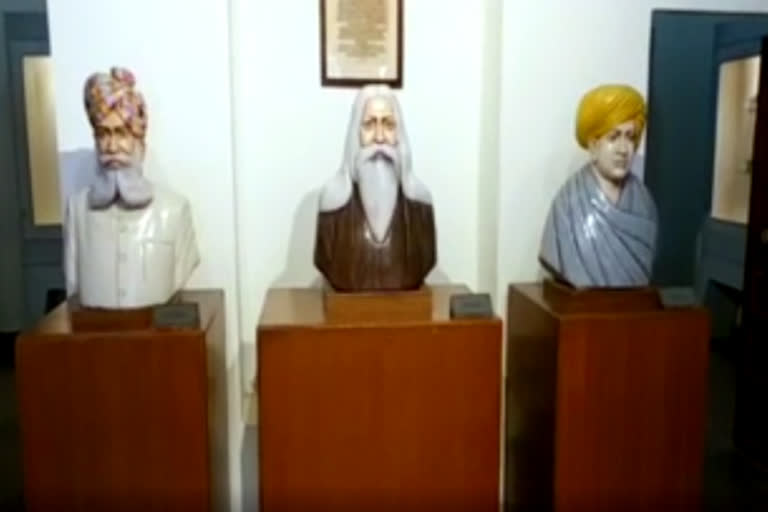Jaipur ( Rajasthan): As India celebrates 75 years of Independence, ETV Bharat brings you stories of India’s freedom struggle in capsules from across the nation. This week it's about the Barhath family in Rajasthan which took the path of revolution to make the British colonial forces leave India. A father, son and brother - trio that sowed the seeds of revolution through folk songs and daring anti-British activities in Rajasthan and parts of Madhya Pradesh. The entire family devoted their life for the cause of India's freedom.
The sacrifice of poet Kesari Singh Barhath and his family still reverberates in every heart of Rajasthani. One among them, Pratap Singh Barhat, son of Kesari Singh Barhath, was martyred at the age of 25; to be precise 13 years before the execution of celebrated young revolutionaries like Bhagat Singh, Sukhdev Thapar and Shivaram Rajguru.
While Bhagat Singh and his friends were executed in 1931, Pratap Singh died in jail in 1918 for lobbing a bomb at the procession of Lord Hardinge in 1912. The incident was marked in the pages of Indian history as "Delhi Conspiracy Case." In fact, it was one of the first such incidents when the Britishers felt the pressure to leave India.
Who is Kesari Singh Barhath?
Kesari Singh Barhath, born on 21 November 1872, was a poet and scholar from the wealthy Barhath family from Shahpura, the immortal land of power, devotion and sacrifice. He was the vassal of Dev Kheda of the Shahpura area, situated in the Bhilwara district of Rajasthan.
Talking to ETV Bharat, Kailash Singh Jadawat, secretary of Shaheed Pratap Singh Barhath Sansthan, quoting Rash Behari Bose, said that there would be hardly any family in the country other than Kesari Singh Barhath who encouraged a son in accepting the path of revolution. "Not just his son Pratap Singh, but also his brother Zorawar Singh plunged into revolution and sacrificed their lives for the country," he added.
Kesari Singh surprised the British colonial forces with his Chetavani Ra Chungatya, a famous historical work composed in Raag Sorath. It was a clarion call for revolution and many youths got influenced by his lyrics.
Kesari Singh, naturally, got into the hitlist of Britishers and was always under their radar as he wrote extensively about nationalism and independence. Nothing stopped him or his son and brother. Later, Kesari was caught and charged with the murder of "Mahant Pyare Lal", and was sent to jail for 20 years in Hazaribagh, Bihar. he died on 14 August 1941.
Association with Mahatma Gandhi
Kesari Singh's mansion was often a hideout for secret consultations to chalk out the strategy of the freedom movement. Despite having revolutionary ideas and strategies in the freedom struggle, he gave full support to Mahatma Gandhi's non-violent movement. Gandhi also chose him for the Salt March.
"The entire family was involved in Dandi Yatra. He had the responsibility of Mewara state under the direction of Mahatma Gandhi. Separately, when Maharana of Mewar was going to Delhi on the call of British ruler, Kesari Singh had given him a warning letter. After reading his letter, the Maharana of Mewar returned without any meeting with the British rulers," senior journalist Moolchand Peswani told ETV Bharat.
Men who died as unsung heroes
Pratap Singh joined a group that was plotting a bomb attack on Lord Hardinge, Viceroy of India on 3 December 1912, on the occasion of transferring the capital of British India from Calcutta to New Delhi. His uncle Zorawar Singh Barhath was also a party to the plan. Pratap Singh was arrested and subjected to brutal torture in Bareilly Central Jail to force him to divulge the names of his compatriots.
He was offered a job and freedom for the whole family, but Pratap Singh Barhath did not share any information with British rulers. When all efforts failed, the interrogating officer told him, “your mother is crying for you”. Then Pratap Singh replied: "I can't let thousands of mothers cry to stop my mother's crying". The brave young man died in jail on 18th May 1918.
The British were so scared of his martyrdom that instead of performing the last rites of Pratap Singh Barhath, his body was buried in jail.
Meanwhile, Zorawar Singh travelled across Malwa in Madhya Pradesh and Rajasthan for 27 years to spread the message of independence. He died on 17 October 1939.
The next generation
ETV Bharat met the great-granddaughter of Kesari Singh Barhath Sarla Kanwar, who said she felt proud to be part of the Barhath family. "I feel proud of the martyrdom of my ancestors while they fought for the freedom of the country," she said.
Even today, the heroic saga of the revolutionary family, who made an indelible mark in the history of India's freedom movement, has a deep influence on the people of Rajasthan. It resonates in every particle of Shahpura, the immortal land of power, devotion and sacrifice. Shahpura is situated in the Bhilwara district of Rajasthan.
A museum set up here depicts the glorious story of Kesari Singh, his brother Zorawar Singh and his son Pratap Singh Barath. The turban of Kesari Singh is still preserved by the museum and is on exhibit.



